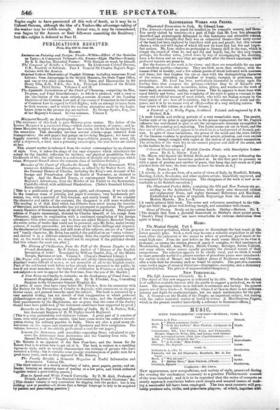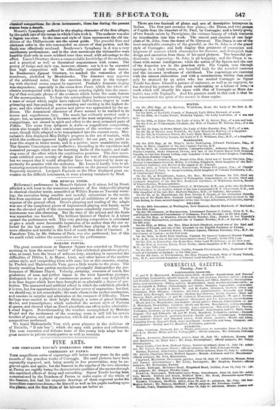MUSIC.
arKril raILHARBIONIO CONCERT—AIONIA&Y, JUNE L
PARS L.
Sinfonia in E Flat Mozart.
" Beat. Diana grausame Gatlin"
Air, 1" 04,1 des Licht's." Herr Pisehek, (Ipaigenie in Dlacir... Autis) Coneertante, MS., Two Violins, Viola, and Violoncello, Messrs. Elaifrove, Willy, Hill, and Lucas.with Orches- tral Accompaniments, (tirat time of performance) SPP,hr.
Reelt. r" Grazie element' Del" Air, 1" A to node," Miss Dolby moreadaute.
Overture, The Regicide Lucas.
PART II.
Sinfonia in A, (No. 7) Beethoven.
Fantasia, sax us Air Bearnaise, Hautbois, Mr. A. La- vigne Brad. Reek." Wieistmir!" }Spahr. Air, Bidder Thor," lien Puckett. (Ries) Overture, Eftment Beethoven. Cotpluetor—Mr. Costa.
NEW appearances, new compositions, and variety of style, preserved during the evening the excitement necessary to a genuine Philharmonic concert of the true standard; and it is to be regretted that the series of' concerts so nearly approach conclusion before such simple and assured means of mak- ing a successful bill have been employed. The two next concerts will pro- bably produce solo, violin, and pianoterte, players; of which, together with
classical compositions for those instruments, there has during the present season been a dearth.
Mozart's Symphony- suffered in the singing character of the first allegro, by the quick rate of the tempo in which Costa took it. The andante was also a degree too slow. In the time and style of these movements the old tra- ditions of the Philharmonic are the surest guide. The graceful flute and clarionet solos in the trio commanded an encore of that portion, and the finale was effectively rendered. Beethoven's Symphony in A was a very satisfactory performance; and in the slow movement the violoncellos were heard in their sole in more subdued tone than usual, with advantage to the effect Lucas's Overture shows a commendable knowledge of the orchestra, and a practical as well as theoretical aequaintanoe with scores. The poetry of design and style was, however, absent; nor is it to be expected that high composition will be effectually recruited at this source. In Beethoven's Eyeased Overture, we marked the restoration of the trombones, abolished by Mendelasehn. The directors may approve of the additional noise; but the sanction thus given to the tamper- ing with classical scores cannot be approved. Pischek's dramatic singing was stupendous; especially in the seen& from Faust, which the whole or- chestra accompanied with a furious vigour, entering rightly into the mean- ing of that energetic phrase of the overture which forms the main feature of the accompaniment. To hear this extraordinary baritone towering over a mass of sound which might have reduced half-a-dozen singers to mere grimacing and face-making, was surprising and exciting in the highest de- gree; and this whirlwind of passion and power was appreciated by the au- dience. The demoniacal character of Foust seemed to be realized in its insane and superhuman fury. The music has evidently awaited such a singer; but, so interpreted, it becomes °neer the most surprising of modern compositions, not second in spirit and effect to the most animated parts of FideEo. The scene from lphigenie in Aulis—a magnificent composition, which also brought with it some reminiscences of the overture—was wel- come, though little adapted to be transplanted into the concert-room. Mer- cadante's Aria displayed Miss Dolby's progress in the art of roulade, with which the audience appeared highly gratified: for our part, we prefer to hear this singer in better music, and in a quieter, more unambitious style. The Quartet Concertante was ineffective; abounding in the repetitions and mannered passages which are the besetting faults of the master, and reali- zing none of the effect which the combination promises. The slow move- ment exhibited more novelty of design than the rest of the composition; but we suspect that it would altogether have been improved by more op- portunity for practice with the orchestra. Mr. Lucas is hardly wise in ad- venturing concerto performance: his intonation on the present occasion was frequently incorrect. Lavigne's Fantasia on the Oboe displayed great ex- ecution on his difficult instrument, in some pleasing variations by Brad.



















































 Previous page
Previous page